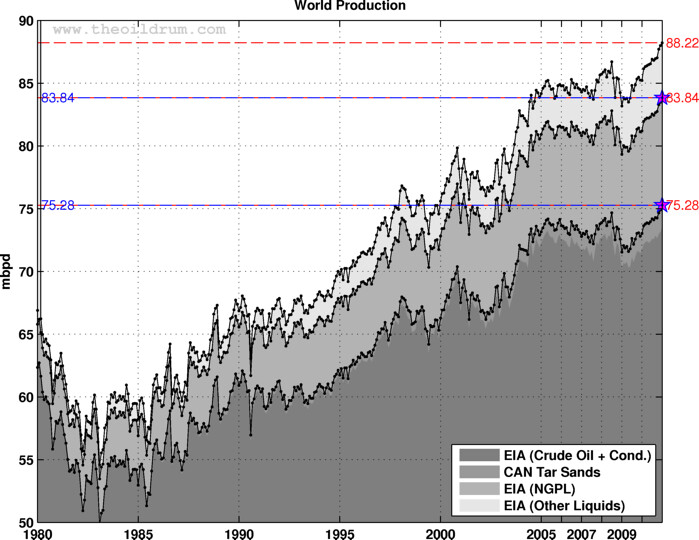
World oil production. Source: Graphoilogy using US EIA data
Near record oil prices (at $110-115/bl, WTI is at its highest ever except for a few weeks in July 2008) suggest that markets continue to be worried about tightness of supply. While some of that is linked to the disruption to Libyan oil production, there is a growing awareness that (i) the supplies of cheap oil are dwindling, and (ii) it is increasingly difficult for supply to follow demand growth.
A lot of the growth in demand comes from emerging markets (including oil producing countries themselves) where fuel prices are subsidised to a more or less large extent and thus demand is not that sensitive to market prices. Despite still growing supply (as shown in the graph above), a lot of the market supply-demand adjustment seems to have to come from demand destruction in those markets subject to full price exposure, ie mainly the rich world. And as we know, demand is not very price-sensitive in the short term, thus the massive price increases required to cause people to drive less or eventually to switch to thriftier cars.
The combination of record production and very high prices suggests that we are in a period of persistent tension on the oil market which will require more demand destruction. In the absence of consistent, systematic policies to wean ourselves off of oil, this will mean more economic pain both at the micro and macro levels.
I mentioned in yesterday's diary that our oil policies (or lack thereof) were at the heart of our support for unsavoury regimes in the Middle East, with all the unintended consequences we've seen (Islamic terrorism, deep mistrust of the West by the oppressed populations), but that point has been largely ignored in the discussion thread...
So, even when consequences stare at us in the face (the economic crisis, oil-inspired foreign policy messes), we seem unable to change our energy policy and to make a real effort at killing our addiction to oil. Indeed, the last US president that gave it a serious try (with real results) was punished in the next election and is still seen as a mediocre president.
Which means only one thing. Even if production is at a record high, there is no doubt that we are running into a wall. There is not enough oil for the coming combined demand of the US, Europe, China and the rest of the world, so demand WILL have to go down somewhere. If that does not happen thanks to smart, pro-active policies, it will happen in a messy, paroxystic way - whether through skyrocketing prices, rationing, economic collapse or all of these.
We still (maybe) have a bit of time to go the route of smart policies. But we won't avoid having to consume less oil in the future.


